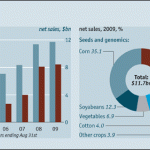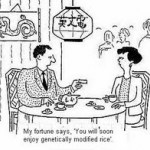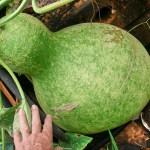
The idea of writing this particular grant proposal at this specific time clearly makes no sense in the framework of my life, with teaching and traveling and kids and a million other things to do. It would border on the insane to try to do this now and to do it well. Yet the intrinsic impossibility of writing this proposal stays with me. It was with me in the pool this morning, where all was quiet except for the sound of strokes and flip turns in the water. It is with me now. I cannot resist thinking through some of our latest results.
And so it begins. Before I fully realize it, I am sucked…
In Memoriam, [Ring out, wild bells]
by Alfred, Lord Tennyson
Ring out, wild bells, to the wild sky,
The flying cloud, the frosty light:
The year is dying in the night;
Ring out, wild bells, and let him die.
Ring out the old, ring in the new,
Ring, happy bells, across the snow:
The year is going, let him go;
Ring out the false, ring in the true.
Ring out the grief that saps the mind
For those that here we see no more;
Ring out the feud of rich and poor,
Ring in redress to all mankind.
Ring out a slowly dying cause,
And ancient forms of party strife;
Ring in the nobler…
On this blog, I will no longer be attempting to explain the difference between genetic engineering and molecular breeding. Instead I will simply refer those interested to Paul Voosen's fine article on the subject published in Scientific American and the New York Times today.
If you are a poor farmer in China, do you care if Monsanto dominates the seed industry in the US?
Apparently not. Several recent reports indicate a rapid launch of GE crops in the less developed world- independent of the US corporate seed industry.
The first news story, reported in the Wall Street Journal and by Reuters is that China has approved release of the worlds first genetically engineered rice. The Bt rice, which was developed by China's Huazhong Agricultural University, is predicted to reduce the use of insecticides by 80 percent while raising yields by as much as 8 percent. This is…
For most people, a fruitcake is an over-sweetened store-bought concoction, dry and dreadful, something to be thrown away as soon as the gift-giving friend has stepped off the front porch or quickly recycled to an unsuspecting colleague.
But this is not how I feel about my mother's fruitcake, a dense mixture of dried fruits and nuts, spiced and infused with brandy.
The taste invokes memories of snowy holidays in a tiny mountain cabin, massive icicles hanging from the eves, the warmth of a fire on cold feet, and a full stomach.
My mother is the cook in our family (although my father has…
One of the pleasures of reading Stewart Brand's new book, "Whole Earth Discipline", is that when it comes to managing the Earth's ecosystem, he is unconstrained by conventional wisdom.
In a break with many old-school environmentalists, Brand argues that the established Green agenda is outdated, too negative, too tradition bound, too specialized, too politically one-sided to address the scale of environmental problems that we face today.
Who better to challenge the rigidity of the long-respected environmental movement than the distinguished writer, lecturer and author of the classic Whole…
Guest blog by Mateo Burtch.
Dear Ms. Doctor Ronald--
I recently had the opportunity to read Simplicity Today, the magazine of the University of Reed alumni association, and its article on you (or someone who looks like you and has the same name as you and is apparently you). I found it to be fascinating and educational in the extreme, so extreme that I actually burned myself on it. I also found it very easy to read, once I mastered the "trick" of holding the magazine rightside-up.
Although, because of time constraints, I was only able to skim a few of the shorter paragraphs, I believe I got…
An article in the Harvard International Review by Paul Collier paints a stark view of African peasantry. Collier presents a convincing argument that for African agriculture to become more productive, it needs modern agricultural technologies and new modes of organization
(Thanks to Eric Ward for alerting me to this article).
"The poverty of African peasants is not accidental: it is intrinsic to the peasant mode of economic organization. The very features that make the peasant mode of production appear attractive to jaded members of an industrialized society also make it unproductive. Large…
An appropriate technology, as asserted by the economist Schumacher in his book Small is Beautiful, should promote values such as health, beauty, and permanence. Low cost and low maintenance requirements are also of prime importance in Schumacher's definition.
Considering both Schumacher's observations and the goals for ecological farming:
⢠Produce abundant, safe and nutritious food
⢠Reduce harmful environmental inputs
⢠Provide healthful conditions for farm workers
⢠Protect the genetic make-up of native species
⢠Enhance crop genetic diversity
⢠Foster soil fertility
⢠Improve the…
Guest blogger Rob Hebert is a second-year student at Georgetown Law. Before moving to DC, he lived in Brooklyn, NY, just blocks from a bar that had over twenty-five beers on tap and thirty arcade machines that all played for a quarter. He can draw you a pretty interesting graph relating "Drinks Consumed" to "Last Score on Pac-Man."
Consumer advocacy groups are a strange animal. It seems that for every influential lobbying group with a senator's ear, there are hundreds or thousands with only vague mission statements and no clear agenda for attaining their stated goals. I once spent a summer…
I am traveling now far away from home towards a large lake in Zurich. What a perfect time to receive this poem from Jan Visser.
Le Lac (written in 1820 by Alphonse de Lamartine)
Ainsi, toujours poussés vers de nouveaux rivages,
dans la nuit éternelle emportés sans retour,
ne pourrons-nous jamais sur l'océan des âges
jeter l'ancre un seul jour?
à lac! l'année à peine a fini sa carrière,
et près des flots chéris qu'elle devait revoir,
regarde! je viens seul m'asseoir sur cette pierre
où tu la vis s'asseoir!
Tu mugissais ainsi sous ces roches profondes;
ainsi tu te brisais sur leurs…
The Daily Star of Dhaka reports today that flood-tolerant rice will soon be officially released in Bangladesh.
The flood-tolerant rice varieties (called Sub1- rice) can help farmers, many who live on less than $1/day, dramatically increase yield during floods.
Dave Mackill of the International Rice Research Institute (formerly of UC Davis) led the precision breeding efforts. The team introduced the Sub1 gene into BR-11 and three other varieties that are popular with farmers and consumers. The new BR-11 Sub1 variety has been embraced by farmers in field trials because it is effectively…
In plant and animal innate immunity, like many of the dances of life, it takes two to tango. A receptor molecule in the plant pairs up with a specific molecule on the invading bacteria and, presto, the immune system swings into action to defend against the invasion of the disease-causing microbe.
Unwrapping some of the mystery from how plants and bacteria communicate in this dance of immunity, hardworking scientists in my laboratory here at the University of California, Davis, have identified the bacterial molecule that matches up with a specific receptor in rice plants to ward off a…
The Changemakers international online community selected biofortified, a group website devoted to providing factual information and fostering discussion about plant genetics, especially genetic engineering, as the grand prize winner in the GMO Risk or Rescue Competition. This would not have been possible without the leadership of Karl Haro von Mogel, graduate student and blogger Anastasia Bodnar, our Australian colleague David Tribe and the votes of the science blogging community. Thanks all.
Here is the announcment:
Our entire team is excited to highlight your idea and your efforts on…
Kent J. Bradford, Professor of Plant Sciences and Academic Director of the Seed Biotechnology Center at UC Davis, is today's guest blogger.
Ever since our ancestors adopted an agricultural lifestyle about 10,000 years ago, our own sustainability has been intimately tied with that of our food production systems. Those systems currently support 6.7 billion humans, or more correctly, adequately support about 5.9 billion with another 800 million or so suffering from food insecurity, malnutrition or hunger. Compare that with the 1960's when the world population was 3 billion, with 1 billion…
Frank N. Foods reports that Biofortified, a science-based blog about plant genetics, gathered more votes than the closest challenger on the changemaker "GMO risk or rescue" competition by a 2-to-1 margin. How did this happen? The science blogging community Pharyngulated the competition thanks to a post by PZ Myers. When the opposition protested in a somewhat unethical manner, PZ hit them again. Although the votes are not final, it looks like biofortified may have won the grand prize- a conversation wtih Michael Pollan about plant genetics. Thanks everyone for your support.
When it comes to plants, there can be no gene flow without two compatible partners. And most plants are quite choosy, preferring a close relative rather than someone outside its family. Pollen travels in gusts of wind, on the pollen basket of bees, as cargo of flies or in the hands of human plant breeders. If the pollen alights upon a compatible mate, there will be fertilization and the resulting seed will carry the genes of the parents. What will happen then if a transgene from a genetically engineered crop plant cross-pollinates with wild relatives?
A new study in PNAS suggests that we…
A recent article in the New York Times indicates that the anti-vaccinators are taking advantage of the H1N1 epidemic to sow fear of vaccination in the population. With 292 deaths so far this year from the H1N1 virus (32% children) you would think parents would take no chances. In contrast consider the number of deaths deaths from the vaccine itself:0.
The risk of serious side effects from the vaccine is virtually non-existent, whereas it is certain that many people that are not vaccinated will die.
Why the protest then? Certainly there are many who simply do not have good information and…
An update from Karl Haro von Mogel:
"A little more than an hour after PZ's post, GM Watch in the UK has wildly claimed that the 'biotech industry' is fixing the contest!"
"The level of conspiracy theorizing reaches astronomical proportions at a moment's notice. Please keep voting, so they won't have the chance to use such falsehoods to attack us."
FYI: Biofortified is a completely independent venture started by two graduate students. It is independently run on a volunteer basis, and is not supported by any funding from any companies.
I work at a non-profit institution and the only thing I…
The latest comments on my new blog reflect ample confusion about whether or not plant genetics can help poor farmers in India.
To demonstrate the power of genetics, I have posted a time-lapse video (4 months) showing the performance of a genetically improved rice in a flooded field plot at the International Rice Research Institute.
This video, shot by Gene Hettle, shows survival of the submergence tolerance (Sub1) rice, developed by our team, after a 17 day flood.
The Sub1 rice yielded about 3 fold more in these field trials. The IRRI team has also introduced the Sub1 gene into rice varieties…






